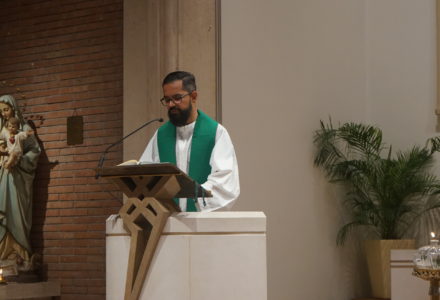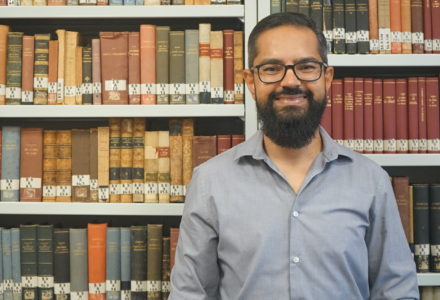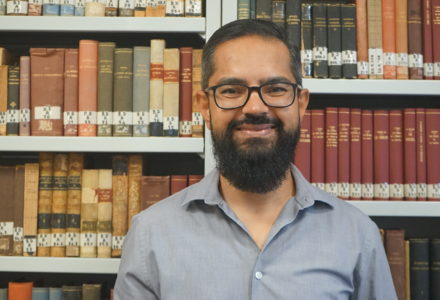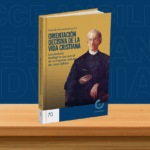A rich journey between Rome and Brazil – Interview with Father Victor Barbosa, scj
Interview with Father Victor Barbosa, former Coordinator of the Dehon Studies Center (CSD) in Rome. He dedicated the last decade to the study, writing, and promotion of the life and writings of the founder, Leo Dehon.
Father Victor, a Dehonian from the Brazil-São Paulo Province (BSP), you spent the last decade in Rome, particularly at the SCJ General House. What were the milestones of this experience, and how did your stay in the Eternal City shape your religious identity and your approach to ministry?
I arrived in Rome in 2015 and, just these days, I am concluding my time in this reality of the Congregation, the General House, to return to my Province in Brazil. In these ten years lived here in Rome, I had various experiences: I completed a licentiate in Spiritual Theology, a Specialization in Theology of Consecrated Life, and then a doctorate in Spiritual Theology. I also participated in the specialization program in Dehon studies offered by the Study Center, a project of the General Government. After all these experiences, I also spent time collaborating at the General House and with the General Government at the Dehonian Study Center, and in the last three years as coordinator of the Center. This period, though long, certainly gave me many opportunities, and I lived truly beautiful experiences here that I will carry as a baggage of riches for my religious life and for my service to the Congregation.
As coordinator of the Studies Center, what initiatives and strategic areas of research most characterized your tenure, with particular reference to the valorization of the charismatic heritage of the Founder?
My work at the Study Center, especially in recent years as coordinator, was obviously very focused on research and study of our founder, Father Dehon, and the spiritual and charismatic heritage of our Congregation. From this experience of work, study, and research, various projects emerged in which I participated and which gave me great satisfaction: being able to engage with these important projects of the Congregation. We have the Dehondocs Originals website, where we have published practically the entire body of work written by our founder, Father Dehon – a task to which I dedicated myself greatly, together with the Center’s team. Then, we also produced various publications and studies, all of which are available online and accessible to everyone through the websites of the Dehoniana magazine and the Studia Dehoniana collection, where truly important resources can be found to better know Father Dehon and the Congregation. I can say that all this gave me a great wealth of knowledge, but what gladdens me most is knowing that it is not knowledge that stays with me alone, but knowledge that, also through work and the experiences lived, I somehow collaborated to make accessible and available to my confreres, members of the congregation, laypeople, and our friends. And that is why it is always very beautiful, and I renew the invitation to explore these resources a bit, because truly beautiful things can be found that can be very useful both for our formation, for our knowledge, but I believe they serve to continue experiencing in the following of our founder, Father Dehon.
What impact did direct contact with Father Dehon’s original writings, mainly drafted in French, have on your research work and on your deep understanding of his spirituality?
Truly one of the beautiful aspects of my work and experience here at the Study Center was contact with Father Dehon’s original texts. We know that most of his texts were written in French, his mother tongue, so everything we find, for example, published on Dehondocs, is in French. It is the language of our founder and certainly for me it was also a great occasion, a beautiful opportunity, to learn this language, which allowed me to read and understand our founder’s texts even better. It is true that not everyone knows French, and for that reason, in these years, we made an effort to make Father Dehon’s texts available in other languages on the Dehondocs International website. So, there is no excuse not to know Father Dehon!
Your doctoral thesis, focused on the theological-decisional analysis of Father Dehon’s Christian experience, represents a significant contribution. Could you briefly illustrate the methodological approach adopted and the main conclusions that emerged from this study?
Indeed, in recent years I conducted doctoral research in Spiritual Theology on our founder, Father Dehon. I did this at the Gregorian University, where we developed a method for analyzing a person’s spiritual experience, and I wanted to apply this method to our founder. The result of this doctorate, with a theological-decisional analysis (because that is the dynamic of the method) of Father Dehon’s spiritual experience, appears in volume 70 of the Studia Dehoniana collection, which is precisely my doctoral thesis, where I seek to analyze Father Dehon’s spiritual experience based on his decisions in life. The thesis is thus available in this printed volume, but it is also accessible online on the Studiadehonianadocs website. It is equally a great joy for me to leave this study to the Congregation and to anyone who wants to know Father Dehon and his experience of faith better, as the fruit of an approach to the founder’s texts through a specific method.
Looking to the future, what will be the next chapters of your mission?
According to the assignment received from my Superior, I will be a member of the scholasticate community in Taubaté, and very likely there I will also exercise teaching as a professor at the Faculdade Dehoniana of the Brazil-São Paulo Province. Then, obviously, other collaboration projects, also at the level of Congregation studies and Dehon studies. I will always be very available to offer these services, according to what our superiors indicate.






